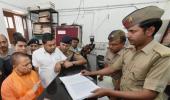The UP panchayat polls are perhaps the world's largest local body elections, which will comprise a nearly 120-million electorate, eligible to elect the members of nearly 59,000 panchayats in the state.
Virendra Singh Rawat reports.

Within weeks of the Yogi Adityanath government completing four years in office on March 19, 2021, the ruling Bharatiya Janata Party will be facing panchayat polls against the backdrop of farm protests and opposition unity on the contentious issue.
Since Rakesh Tikait, a prominent farmers' leader representing the Bharatiya Kisan Union (BKU) in the harvest-rich Western Uttar Pradesh region, has become the rallying point of the protests at the Delhi borders, the panchayat polls will be seen as a kind of verdict from the hinterland for Yogi Adityanath ahead of the crucial 2022 Uttar Pradesh elections.
The tenure of the state panchayat bodies at the village, block and district levels had ended in December 2020, and the Allahabad high court had last month directed the UP Election Commission to ensure that polls were held by April 30, while rejecting the panel's submission to do so in May.
The electoral rolls for these polls are different from the ones prepared by the Election Commission of India (ECI) for assembly and parliamentary elections.
The UP panchayat polls are perhaps the world's largest local body elections, which will comprise a nearly 120-million electorate, eligible to elect the members of nearly 59,000 panchayats in the state.
In the 2015 panchayat elections in UP, there were about 117 million eligible voters.
Besides, the influx of almost 4 million migrant workers following Covid-19 lockdown last year has added another dimension to these polls.
Although a chunk of this workforce has since returned to the states where they worked, a sizeable number has stayed put in UP, seeking employment.
The rising sugarcane arrears, which currently top Rs 12,000 crore, coupled with the fact that the government has refrained from increasing the state-advised cane price for the 2020-21 crushing season, is seen as a negative factor for the ruling party ahead of the elections, especially in the cane-growing belts of western UP.
Though these elections are not contested on party symbols, candidates openly owe allegiance to parties, while political outfits also extend support to their nominees.
Nonetheless, the BJP is confident of winning the elections on the basis of its self-acclaimed good performance over the last four years and agricultural schemes, including paying more than Rs 1.15 trillion to sugarcane farmers, speedy evacuation of state workers from other states following lockdown, mapping the skills migrant workers, and providing them employment locally.
"We have worked for the welfare of farmers over the last four years through our targeted policies and programmes," senior BJP leader Chandra Mohan said.
He denied the possibility of farmers' unrest in UP over the new farm laws.
"There are no farm protests in UP and the state's farmers have by and large supported the new laws. We are confident of winning their confidence once again in the coming panchayat elections."
However, the Samajwadi Party, principal opposition, is gearing up to mount an aggressive campaign against the ruling party, saying that the BJP was anti-farmer and that farmers were unhappy with the performance of the government.
"The way the BJP government has treated the farming community shows its anti-farm mindset … The ruling party will fare miserably in the coming panchayat polls," senior SP leader Anurag Bhadauria noted.
He said the SP was working at the grassroots and galvanising its rank and file to take on the ruling party.
According to UP Additional Chief Secretary (Panchayati Raj) Manoj Kumar Singh, of the gram panchayat seats, 330 are reserved for scheduled tribes, 12,045 for scheduled castes, and 15,712 for other backward classes.










